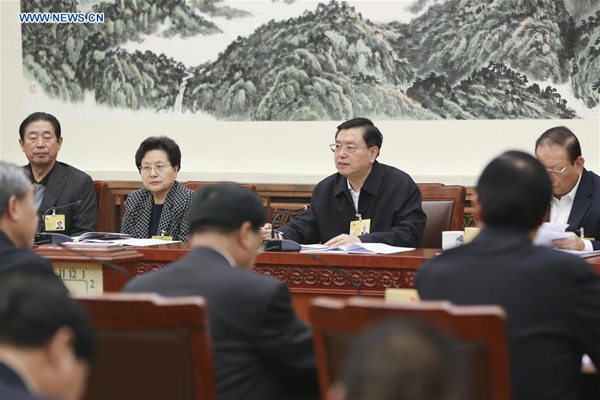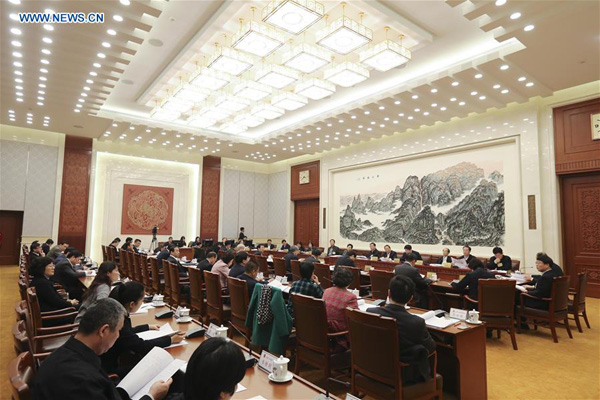Top legislature mulls draft laws on domestic violence, counterterrorism in bimonthly session

Zhang Dejiang (back 2nd R), chairman of the Standing Committee of China's National People's Congress (NPC), attends a group meeting reviewing the draft law of counterterrorism and the draft law against demestic violence, during the 18th session of the 12th NPC Standing Committee, in Beijing, capital of China, Dec. 21, 2015.(Xinhua/Ding Lin)
BEIJING -- The top legislature started its bimonthly session on Monday as legislators gathered to deliberate draft laws and amendments on domestic violence and counterterrorism among others.
Zhang Dejiang, chairman of the 12th National People's Congress (NPC) Standing Committee, presided over the meeting and attended panel discussions.
The draft counterterrorism law, tabled for a third reading, elaborated on what would be deemed "terrorism" and sought to regulate media coverage of terrorist attacks.
According to the new draft, terrorism is defined as any proposition or activity -- that, by means of violence, sabotage or threat, generates social panic, undermines public security, infringes personal and property rights, and menaces government organs and international organizations -- with the aim to realize certain political and ideological purpose.
Meanwhile, it said no institutions and individuals shall fabricate and disseminate information on forged terrorist incidents, report on and disseminate details of terrorist activities that might lead to imitation, nor publish scenes of cruelty and inhumanity in terrorist activities.
None, except news media with approval from counterterrorism authorities in charge of information distribution, shall report on or disseminate the personal details of on-scene workers, hostages or authorities' response activities, the draft read.
The draft domestic violence law was also up for a reading on Monday. Lawmakers deliberated whether to include emotional or psychological abuse and the inclusion of cohabitation in order to protect traditionally silent abuse victims.
The draft defines domestic violence as both physical and psychological harm inflicted by relatives, including assault, injury, restraint or forcible limits on physical liberty as well as recurring verbal abuse.
In addition, the top legislature mulled a draft bill to introduce national medals and honorary titles for both citizens and foreigners.
According to the draft, the nation will introduce Medals of the Republic to honor people who have made "great contributions and distinguished service in the country's socialist construction with Chinese characteristics and defense of the nation." ' Friendship medals will be given to foreigners who "have made outstanding contributions to socialist modernization, promoted exchange and cooperation between China and the world, and helped maintain world peace," the draft said.
The draft would also enable the president to give friendship medals to prominent foreign politicians and international friends during state affairs without permission from the top legislature.
Legislators are also considering amendments to the family planning law amid efforts to counter a shrinking workforce and an aging population.
"The state advocates that one couple shall be allowed to have two children," according to a draft amendment submitted for review.
The draft came after the Communist Party of China (CPC) Central Committee decided in October on a universal two-child proposal, which will replace the decades-long "one couple, one child" policy.
A draft law amendment for the protection of wildlife, meanwhile, focused on habitat protection.
The current law was promulgated in March 1989. It promoted the protection of wildlife, however, protection efforts still encounter severe challenges.
In addition to poaching, encroachment and damage of habitat continues, directly leading to the decline of wildlife. Therefore, an amendment is needed.
A draft amendment to the education law was also submitted to strengthen use of "Putonghua" (mandarin Chinese), and Chinese characters, along with local languages.
The draft called for bilingual education in autonomous areas. It underscored that in schools and other educational institutions where students of ethnic minority groups are the majority, teaching should be bilingual.
The draft Law on Traditional Chinese Medicine (TCM) was also read during the session. The law was proposed further incorporation of TCM across the whole healthcare system.
The draft law will support TCM's role, making it more available to the general public.
The top legislature is also considering offering higher tax deductions on charitable donations made by enterprises, according to revisions to the draft charity law.
The draft law included special tax concessions for philanthropic activities.
Moreover, a registration-based stock listing, proposed by the State Council, China's cabinet, is also being reviewed. If approved, the State Council will be able to change the listing system on the Shanghai and Shenzhen bourses from approval-based to registration-based any time within the next two years, easing funding difficulties for companies
The top legislature will also review a treaty between China and Iran on transfer of the management of convicts, and a treaty on friendly cooperation between China and Belarus.
The bimonthly session is scheduled to conclude on Sunday.

Zhang Dejiang, chairman of the Standing Committee of China's National People's Congress (NPC), attends a group meeting reviewing the draft law of counterterrorism and the draft law against demestic violence, during the 18th session of the 12th NPC Standing Committee, in Beijing, capital of China, Dec. 21, 2015.(Xinhua/Ding Lin)



